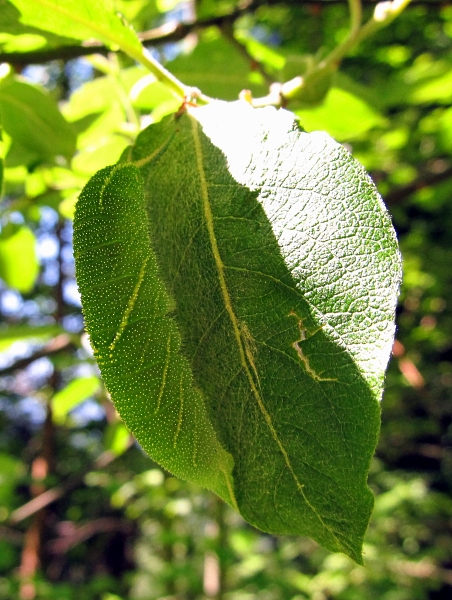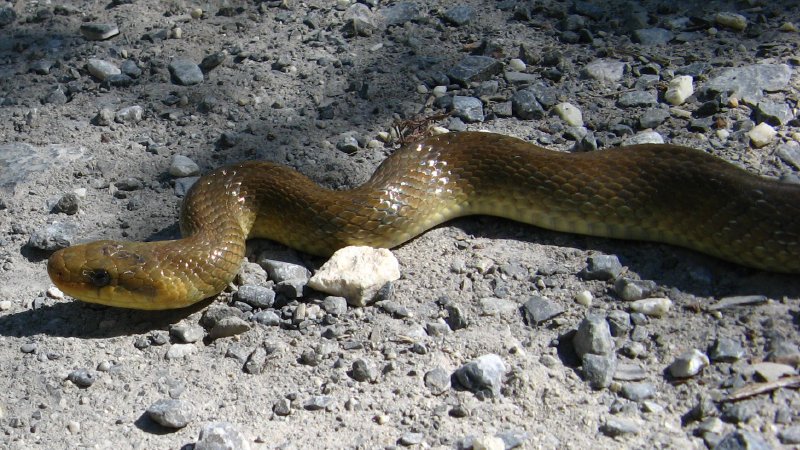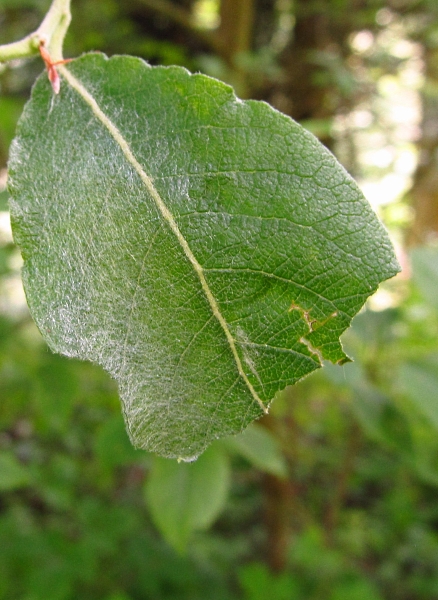Page 35 of 220
Re: Padfield
Posted: Sun Jun 10, 2012 7:31 pm
by NickMorgan
Wow, 46 species in one walk!! Thank you for sharing them with us. It's good to know that despite the cold grey weather here there are places in the world where butterflies are flying. I was pleased to find some caterpillars today, but no chance of butterflies!
Re: Padfield
Posted: Mon Jun 11, 2012 5:33 pm
by Padfield
It's been mostly cool and wet here too, Nick! No butterflies today.
HOWEVER, I did check on Aurelian. For the last few days he's been in exactly the same position on the same leaf every time I've looked and one could be forgiven for thinking he hasn't moved. It seems this is an illusion. When I arrived tonight, at 18h10, he was just sneaking back onto his leaf from some excursion:

I watched from a distance, as I am very keen not to disturb him and scare him into moving off somewhere! So these pictures are all handheld from over 2m. As I watched he slid swiftly but with no perceptible movement into his usual position:




Guy
Re: Padfield
Posted: Wed Jun 13, 2012 12:48 pm
by Padfield
Day 17 of his 5th instar:

Guy
Re: Padfield
Posted: Wed Jun 13, 2012 1:45 pm
by dilettante
For such a large beast, that's pretty good camouflage!
Re: Padfield
Posted: Wed Jun 13, 2012 1:52 pm
by Pete Eeles
I must admit, I think iris are one of the best-camouflaged of all immature stages (both larva and pupa). When I've reared them in captivity within a sleeve on Sallow, and knowing that they're right in front of my eyes, I still struggled to find them! And I believe that the "seat leaf" (as it's known) remains uneaten to provide the perfect camouflage that you see. Can't be long before Aurelian gets ready to pupate!
Cheers,
- Pete
Re: Padfield
Posted: Wed Jun 13, 2012 7:36 pm
by Matsukaze
Pete Eeles wrote:And I believe that the "seat leaf" (as it's known) remains uneaten to provide the perfect camouflage that you see.
Hi Pete,
Is this the case for the later instars only? The really tiny larvae would not need to mimic the entire leaf and it would save them some long journeys.
Re: Padfield
Posted: Wed Jun 13, 2012 7:43 pm
by Pete Eeles
Matsukaze wrote:Pete Eeles wrote:And I believe that the "seat leaf" (as it's known) remains uneaten to provide the perfect camouflage that you see.
Hi Pete,
Is this the case for the later instars only? The really tiny larvae would not need to mimic the entire leaf and it would save them some long journeys.
I believe so. It certainly doesn't apply to 1st instar larvae which can be located based on their characteristic feeding damage

Cheers,
- Pete
Re: Padfield
Posted: Wed Jun 13, 2012 8:30 pm
by Padfield
Aurelian has moved around a lot but didn't seem so particular about not nibbling his resting leaf until this last instar.
In his fourth instar he spent much time on this leaf:

I think he was responsible for those bite marks. What a life - just eating and sleeping!

He shed his skin on that leaf and then immediately moved to a better one.
Guy
And a reminder of what the tiny first instar looks like, completely dwarfed by the leaf (but still fully aware he has to sit in the leaf tip...):

(That was Hadrian, in 2010)
Re: Padfield
Posted: Wed Jun 13, 2012 9:36 pm
by David M
Amazing contrast.
Makes you really appreciate what these insects have to do to survive.
Re: Padfield
Posted: Fri Jun 15, 2012 5:01 pm
by Padfield
Day 19 of the fifth instar:

I couldn't visit until after school, at about 5.30pm, but even then a few other butterflies were around. Large walls are always present there in the summer, flitting around the smooth rocks beside the path:


Surprise of the day was a woodland brown, that flew across the path and up into an elm tree. This is my earliest sighting of the species at this altitude - my earliest altogether being 14th June, near Geneva. Last year, which was a very early year, my first woodland brown was 17th June. This is the proof shot - maximum zoom and heavily cropped - for my records:

Less surprising was my first dark green fritillary of the year.

Guy
Re: Padfield
Posted: Sat Jun 16, 2012 3:34 pm
by Padfield
I had to work in the morning so stayed local in the afternoon, checking out local high-altitude spots.
Things are much later this year than last. I had hoped for clouded Apollo, alpine argus, dewy ringlet and perhaps even an early cranberry blue. But apart from a single dewy ringlet that loped across my path at 2200m I saw none of these. I did see an alpine grizzled skipper (
Pyrgus andromedae) but unfortunately met another walker coming in the opposite direction at just that moment and only got a poor record shot with the wrong exposure:

Also flying were grizzled skippers and a few olive skippers.

(Grizzled -
Pyrgus malvae)

(Olive skipper -
Pyrgus serratulae)
At altitude little blues and small tortoiseshells were the only thing I saw in more than ones and twos. A single bright-eyed ringlet flew across the path, a single northern wall showed up as I descended the peak and a single
Boloria sp. (probable
pales) also cruised by. This might have been partly due to the wind, which was quite strong - but I had a feeling vegetation was late and there really were rather few butterflies.
Here is that northern wall - clearly not fresh on the wing:

(just another record shot, I'm afraid)
A little lower down, between 1800m and 1600m, I revisited my
helle site. The vegetation was pristine - no one else had visited since my last trip up, in May. It was thick, lush aconite-leaved buttercups with dense swathes of bistort and plenty of globeflowers thrown in too. I had intended to try and film female violet coppers laying (there were only males on my last visit) but there was no way I was going to deface that beautiful wetland by trampling the vegetation so I waited at the edges and photographed what I could. I did find a gravid female, diving down to look for laying sites, but she didn't lay while I watched:


(this is deep down among the stems)

While she worked, males sat around taking nectar and occasionally chasing females they hoped might be receptive virgins. These are two different individuals:


Every violet copper I saw showed signs of wear and tear. On May 30th they were all fresh (except one) and all males. The mixture of sun and rain (including several storms) we have had almost daily since then has meant they have been active but weathering sometimes tough conditions.
Much later than usual, the first marsh fritillaries are flying:

Other species on the wing were chequered skippers, green hairstreaks and Berger's pale clouded yellows. I thought I saw a mountain clouded yellow zoom past but I lost it and an unmistakeable Berger's took its place.

A male chequered skipper defending his spot against violet coppers and marsh fritillaries...

A female Berger's pale clouded yellow. You can see the wind in the grass behind - it was blowing strongly all afternoon, making photography tricky.
Guy
Re: Padfield
Posted: Sun Jun 17, 2012 8:40 pm
by Padfield
In the interests of science, and at the risk of boring and alienating regular visitors to my diary, I present Aurelian on day 21 of his fifth instar:


He
really likes that leaf and if growing up means abandoning it I fear he will resist growing up at all costs!
New for the year on my local patch today were high brown fritillary, silver-washed fritillary, ringlet and purple-edged copper - the last being an egg-laying female so I cleary missed out on the first emergences of this species.
As I cycled down a small hill in Huémoz I noticed a branch lying across the road. I was just about to try and leap it when I realised it was a huge Aesculapian snake - at least 4 feet long and probably rather more. I've never seen one up here before, though they are regular in the heat of the Rhône Valley. I screeched to a halt and immediately grabbed for my camera as the snake looked at me in alarm and then bolted up the verge as fast as it could. I just got this one shaky picture of it as it disappeared:

Here's a rather better picture of one in the Rhône Valley in 2008:

This snake is named after the Greek physician Asclepius (various spellings) and best known from depictions of it twined around his staff - the 'rod of Asclepius', a common symbol of medical organisations:

(Wikimedia)
Guy
Re: Padfield
Posted: Sun Jun 17, 2012 8:59 pm
by Wurzel
That Berger's shot is simply stunning

Have a goodun
Wurzel
Re: Padfield
Posted: Mon Jun 18, 2012 11:45 am
by Mark Senior
By coincidence , I have just sold a Roman Copper coin of Clodius Albinus which had a depiction on the reverse of Aescupalapus with rod entwined with snake .
Re: Padfield
Posted: Mon Jun 18, 2012 7:57 pm
by Padfield
Interesting. I did a little web research on Clodius Albinus coins and found this was a recurrent theme.
FINALLY, Aurelian has vacated his seat leaf and, I presume, gone off to pupate somewhere. I couldn't find him with a cursory search but he might have gone some distance and should be on the back of a leaf at the moment - or perhaps still wandering, looking for the right leaf. I will revisit at the end of the week and search thoroughly for his lime-green chrysalis.
Before moving on he consumed the tip end of his seat leaf - the one he had kept entire throughout his 3-week tenure of it:

Initially, this sight alarmed me, as I wondered if he had been forcibly removed by a predator. But the leaf is most certainly eaten - I think nibbled - rather than torn. I can't imagine any realistic scenario in which anyone other than him did this.
If you compare that image with this next, taken 24 hours previously (the same picture I posted yesterday) you can see that he has taken a rather large final meal and must have consumed quite a lot of his own silk in the process. I wonder if eating the seat leaf like this helps recycle the nutrients, or even whole proteins, he will need to make his next silken attachment - which will have to be very strong, and last.

Guy
Re: Padfield
Posted: Mon Jun 18, 2012 9:02 pm
by Pawpawsaurus
Good luck with your search - I think you've already done remarkably well in managing to follow him thus far.
Whether you're successful or not in tracking down the chrysalis this has already been an extremely interesting account of Aurelian's life story. Let's hope it has a happy ending.
Paul
Re: Padfield
Posted: Mon Jun 18, 2012 9:39 pm
by David M
Agreed. This saga has kept me going throughout last winter and into spring and summer!
I actually feel genuinely concerned right now for his well-being in case a predator has gobbled him up at the last moment.
Re: Padfield
Posted: Fri Jun 22, 2012 4:23 pm
by Padfield
Thank you Paul and David. I certainly didn't expect to follow him this far when I found him last year!
I searched in vain for his chrysalis today. I'm sure he's there somewhere - but he must have moved some considerable distance from his seat leaf as he doesn't appear even to be on the same tree. I have about two weeks to locate him...
While looking, I did come across another hornèd caterpillar that appears to be on the point of pupating:

It is similar in size to an
iris cat, though slightly shorter, and has pairs of bristles on its nape, shoulders and rear end. It is positioned beneath a sallow leaf and has adopted the pupation posture so I may well find a chrysalis there if I check in a few days. Or not - these creatures usually elude me.
If anyone knows what species this is, I would be very interested.
A couple of woodland browns were flitting around in the woods and I got a long-shot through bramble of one of them before it bounced up into the trees:

I am very fortunate to have thriving local colonies of this fascinating brown.
Guy
Re: Padfield
Posted: Fri Jun 22, 2012 5:13 pm
by Rogerdodge
Guy
I think your horny catty is Eyed Hawk.
I hope you find Aurelian.
Your perseverence deserves reward.
Re: Padfield
Posted: Fri Jun 22, 2012 5:23 pm
by Reverdin
Sorry Roger... it seems to have a horn at BOTH ends.... or is that an illusion


Try Aglia tau - the Tau Emperor Moth ???????
see
http://www.rainerroth.de/sammlung/insek ... a_tau.html
































